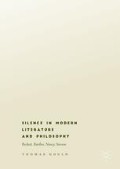Abstract
Through close analysis of a series of poems, Gould suggests ways in which Wallace Stevens’ poetry negotiates themes of silence and unsayability, in particular relation to anteriority and origin. Gould shows ways in which Stevens’ poetry collapses the distinction between silere and tacere, surveys various dialectical or dualistic approaches to Stevens’ poetry, and pursues a series of theoretical and philosophical digressions. Through a comparison between the poem “Girl in a Nightgown” and a fragment from Maurice Blanchot’s The Writing of the Disaster, Gould explores the relationship between silence, the imperative of language, and the experience of the limits of perception and intellection. Finally, Gould considers various critical and philosophical approaches to the silence of animals, before discussing examples of silent animality in a selection of poems by Stevens.
Access this chapter
Tax calculation will be finalised at checkout
Purchases are for personal use only
Bibliography
Agamben, G., Homo Sacer: Sovereign Power and Bare Life, trans. D. Heller-Roazen, Stanford: Stanford University Press (1998).
———, Infancy and History, trans. L. Heron, London: Verso (2007).
Altieri, C., Wallace Stevens and the Demands of Modernity, Ithaca and London: Cornell University Press (2013).
Balso, J., Affirmation of Poetry, trans. D.S. Burk, Minneapolis: Univocal (2014).
Barthes, R., The Neutral, trans. R.E. Krauss and D. Hollier, New York: Columbia University Press (2005).
Benjamin, W., Walter Benjamin: Selected Writings Volume 1. 1913–1926, ed. M. Bullock and M. W. Jennings, Cambridge: Harvard University Press (1996).
Benveniste, E., Problems in General Linguistics, ed. M.E. Meek. Coral Gables, FL: University of Miami Press, (1966).
Blanchot, M., The Writing of the Disaster, trans. A. Smock, Lincoln and London: University of Nebraska Press (1995).
Blessing, R., Wallace Stevens’ “Whole Harmonium”, Syracuse: Syracuse University Press (1970).
Blevins, J., “‘Suppose This Was the Root of Everything’: Stevens and the Imperative to Suppose”, in Wallace Stevens Journal, Vol. 37, Issue 1, Spring 2013, 70–90.
Bloom, H., Wallace Stevens: The Poems of Our Climate, Ithaca and London: Cornell University Press (1980).
Celan, P., Collected Prose, trans. Rosemarie Waldrop, New York: Routledge (2003).
Cohen, J., “Stevens’ Poetics of Resemblance”, in Wallace Stevens Across the Atlantic, ed. B. Eeckhout and E. Ragg, New York: Palgrave Macmillan (2008).
Cook, E., Poetry, Word-Play, and Word-War in Wallace Stevens, Princeton: Princeton University Press (1988).
Critchley, S., Things Merely Are, London and New York: Routledge (2005).
De Man, P., Blindness and Insight: Essays in the Rhetoric of Contemporary Criticism, Minneapolis: University of Minnesota Press (1986).
Derrida, J., Of Grammatology, trans. G. Spivak, Baltimore: Johns Hopkins University Press (1976).
———, The Animal That Therefore I Am, trans. D. Wills, New York: Fordham University Press (2008).
Eeckhout, B., “When Language Stops…Suspension Points in the Poetry of Hart Crane and Wallace Stevens”, in Semantics of Silences in Linguistics and Literature, ed. G.M. Grabner and U. Jessner, Heidelberg: Winter (1996).
———, Wallace Stevens and the Limits of Reading and Writing, Columbia: University of Missouri Press (2002).
Eliot, G., Middlemarch, ed. R. Ashton, London: Penguin (1994).
Heidegger, M., Being and Time, trans. J. Macquarrie and E. Robinson, New York: HarperCollins (2008).
Hill, L., Maurice Blanchot and Fragmentary Writing: A Change of Epoch, London: Continuum (2012).
Hillis Miller, J., Poets of Reality, London: Oxford University Press (1966).
———, The Conflagration of Community: Fiction Before and After Auschwitz, Chicago: University of Chicago Press (2011).
Jameson, F., “Wallace Stevens”, in New Orleans Review, Vol. 11, 1984, 10–19.
Johnson, B., “Pure Poetry, Ideas of Order, and the Problem of Poetic Solitude”, in The Wallace Stevens Journal, Vol. 32, Issue 2, Fall 2008, 181–205.
Lacoue-Labarthe, P., Poetry as Experience, trans. A. Tarnowski, Stanford: Stanford University Press (1999).
Leggett., B.J., Early Stevens: The Nietzschean Intertext, London: Duke University Press (1992).
Lentricchia, F., “Wallace Stevens: The Ironic Eye”, in Wallace Stevens: A Critical Anthology, ed. I. Ehrenpreis, London: Penguin (1972).
Longenbach J., Wallace Stevens: The Plain Sense of Things, New York and Oxford, Oxford University Press (1991).
Mao, D., Solid Objects: Modernism and the Test of Production, Princeton: Princeton University Press (1998).
Meillassoux, Q., After Finitude: An Essay on the Necessity of Contingency, trans. R. Brassier, London: Bloomsbury (2009).
Nancy, J., The Sense of the World, trans. J. S. Librett, Minneapolis: University of Minneapolis Press (1997).
———, A Finite Thinking, ed. S. Sparks, Stanford: Stanford University Press (2003).
———, Adoration: The Deconstruction of Christianity II, trans. J. McKeane, New York: Fordham University Press (2013).
Picard, M., The World of Silence, trans. S. Goodman, London: The Harvill Press (1948).
Plato, Phaedrus, trans. C. Rowe, London: Penguin (2005).
Rosu, A., The Metaphysics of Sound in Wallace Stevens, London: The University of Alabama Press (1995).
Schulze, R., The Web of Friendship: Marianne Moore and Wallace Stevens, Ann Arbor: University of Michigan Press (1995).
Shaviro, S., ‘“That Which Is Always Beginning’: Stevens’ Poetry of Affirmation”, in PMLA, Vol. 100, Issue 2, 1985, 220–233.
Steiner, G., Language and Silence, London: Faber and Faber (1985).
Stevens, W., Letters of Wallace Stevens, ed. H. Stevens, New York: Knopf (1972).
———, The Necessary Angel, London: Faber and Faber (1984).
———, Opus Posthumous, New York: Alfred A. Knopf (1989).
———, The Collected Poems of Wallace Stevens, New York: Vintage (1990).
———, Wallace Stevens: Collected Poetry and Prose, ed. F. Kermode and J. Richardson, New York: Library of America (1997).
Woodland, M., Wallace Stevens and the Apocalyptic Mode, Iowa City: University of Iowa Press (2005).
Ziarek, K., Inflected Language: Toward a Hermeneutics of Nearness, Albany: State University of New York Press (1994).
Author information
Authors and Affiliations
Rights and permissions
Copyright information
© 2018 The Author(s)
About this chapter
Cite this chapter
Gould, T. (2018). Some Senses of Silence in Wallace Stevens. In: Silence in Modern Literature and Philosophy. Palgrave Macmillan, Cham. https://doi.org/10.1007/978-3-319-93479-2_5
Download citation
DOI: https://doi.org/10.1007/978-3-319-93479-2_5
Published:
Publisher Name: Palgrave Macmillan, Cham
Print ISBN: 978-3-319-93478-5
Online ISBN: 978-3-319-93479-2
eBook Packages: Literature, Cultural and Media StudiesLiterature, Cultural and Media Studies (R0)

